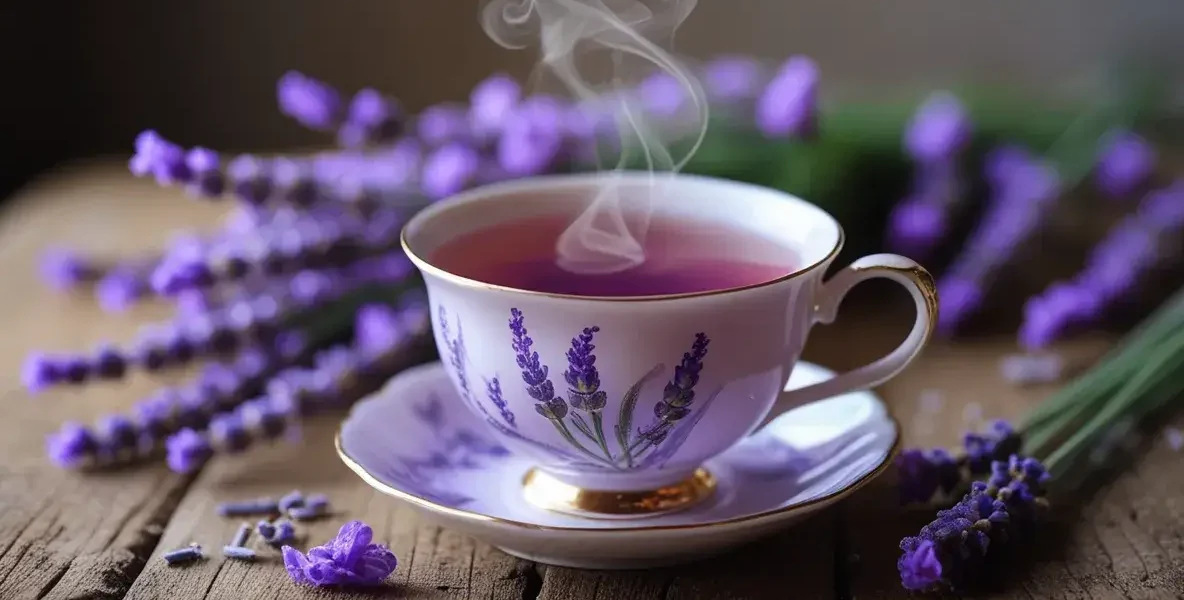Table of Contents
Does lavender tea make you pee more frequently? If you’ve ever enjoyed a cup of tea only to find yourself rushing to the bathroom shortly after, you’re not alone. Caffeine is a mild diuretic, which means it encourages your body to produce more urine and leads to more frequent urination. In fact, due to a study performed in 1928, many people have believed that the diuretic effect of caffeine in tea cancels out its hydration benefits.
However, not all teas are created equal when it comes to their effects on your bladder. Black tea has the highest caffeine content among teas, with around 40 to 70 mg per 250 ml cup, while green tea typically contains a moderate amount, around 30 to 50 mg per cup. Additionally, caffeine can make any symptoms of urgency or frequency worse because it relaxes the muscles in your pelvis and urethra. But what about lavender tea specifically?
Known for its relaxing, analgesic and anti-inflammatory properties, lavender tea offers several health benefits including reduced anxiety, improved sleep quality, and relief from headaches. In this article, we’ll explore whether lavender tea has diuretic effects similar to caffeinated teas, and what science tells us about this aromatic herbal infusion and its impact on your bathroom habits.
What does lavender tea do in the body?
Lavender tea works through multiple pathways in your body, producing a range of beneficial effects beyond just a pleasant aroma. Understanding these mechanisms helps explain why this herbal infusion has been used medicinally for centuries.
Relaxing and calming effects
Lavender tea’s primary claim to fame comes from its impressive ability to soothe your nervous system. Research indicates that compounds in lavender stimulate activity in specific brain areas, influencing the transmission of impulses between brain cells to boost mood and create a calming effect. According to studies, lavender contains linalool, a compound that has been shown to reduce anxiety and even lower blood pressure.
Furthermore, lavender works directly on the nervous system by inhibiting GABA receptors – essentially mimicking the role of neurotransmitters to decrease stress levels. This explains why many people experience immediate relaxation after sipping a warm cup of this floral brew.
Impact on digestion and bloating
Beyond its mental effects, lavender tea offers significant benefits for your digestive system. The anti-inflammatory properties found in dried lavender flowers help soothe stomach muscles, potentially eliminating discomfort. Notably, lavender tea exhibits antispasmodic effects that ease symptoms of gas and bloating.
Enjoying lavender tea after meals aids digestion as it stimulates the production of bile, which helps your body break down food more efficiently. For women experiencing menstrual discomfort, lavender’s ability to soothe muscle spasms can provide welcome relief from cramps.
Lavender tea benefits for sleep and anxiety
One study involving new mothers found that those who drank one cup (250 ml) of lavender tea daily for two weeks while appreciating its aroma reported less fatigue and depression compared to those who didn’t. Likewise, research showed that women who took 10 deep breaths of lavender fragrance four days weekly for eight weeks experienced significantly better sleep quality.
Clinical trials conducted in 2020 demonstrated that regularly drinking lavender tea helped stabilize mood and reduce anxiety in adults over 65 years old. Interestingly, lavender may even improve your body’s melatonin levels, supporting more restful sleep.
Generally, lavender’s calming properties make it especially valuable for those seeking natural remedies for anxiety and sleep issues without the side effects of pharmaceutical options.
👉 Discover the Best lavender tea for proven relaxation today 👈
Can lavender tea make you pee more?
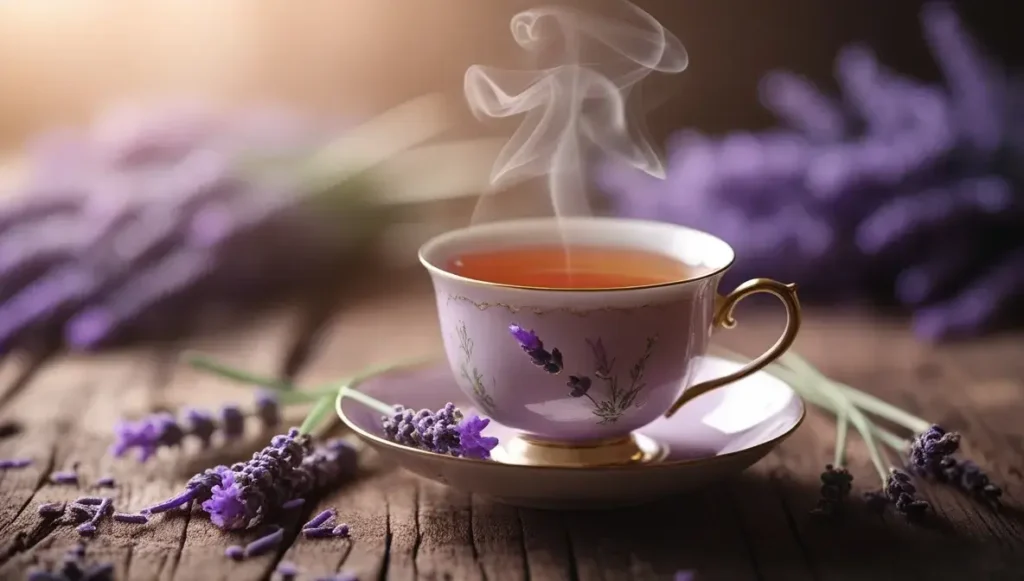
Many tea drinkers wonder about the bathroom visits that often follow their favorite beverage. Let’s explore whether lavender tea specifically increases urination and what science tells us about its effects on the body.
Understanding natural diuretic effects
A diuretic is any substance that promotes the production of urine, consequently increasing the frequency of urination. Various herbal teas possess natural diuretic properties that can help relieve symptoms like swelling and bloating from water retention. These natural diuretics work by stimulating the kidneys to filter more sodium and water from the blood, resulting in increased urine output.
Regarding lavender specifically, research suggests it may indeed have mild diuretic properties. One source directly states that “lavender tea may have a mild diuretic effect that helps with fluid retention”. Moreover, lavender has traditionally been known as a diuretic remedy and an antiseptic for the urogenital tract.
How lavender compares to other herbal teas
Unlike teas such as elderflower, rose, wild blackberry, and nettle that have pronounced diuretic effects, lavender’s influence on urination appears more moderate. Interestingly, certain studies indicate that lavender oil (though different from tea) might have some diuretic actions.
Several herbal teas are classified as having stronger diuretic effects than lavender. For instance, green tea, parsley tea, and linden tea are well-documented natural diuretics. Primarily, the difference often relates to the presence of caffeine, which lavender tea doesn’t contain.
Does lavender tea cause dehydration?
Despite its mild diuretic properties, lavender tea is unlikely to cause dehydration under normal consumption patterns. Since herbal teas like lavender are typically caffeine-free, they don’t have the dehydrating effects sometimes associated with caffeinated beverages. In fact, herbal teas are considered hydrating options that can contribute to your daily fluid needs.
Still, moderation remains important. Experts recommend not consuming diuretic teas for more than 7 consecutive days without medical supervision, as some may increase the elimination of important minerals through urine, potentially causing bodily imbalances. Furthermore, individuals taking synthetic diuretics or those with kidney problems, heart disease, or low blood pressure should avoid diuretic teas altogether.
Lavender tea vs. other teas that make you pee
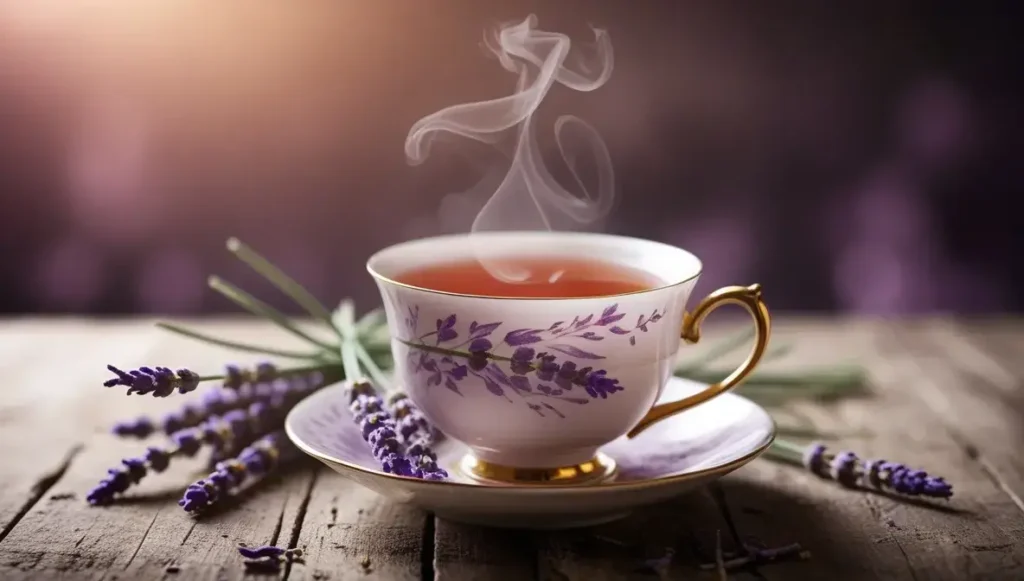
Looking at the broader world of teas, certain varieties affect urination patterns far more than lavender. Let’s examine which ones might send you racing to the bathroom most frequently.
Does green tea make you pee more?
Green tea contains moderate caffeine levels, ranging between 30-50 mg per cup. This caffeine acts as a natural diuretic by increasing blood flow to your kidneys, reducing water absorption, and subsequently promoting urination. Even with this effect, research indicates that drinking 2-3 cups daily is typically recommended to maximize its diuretic benefits. Yet, as your body develops caffeine tolerance, the diuretic effect becomes less noticeable.
Black tea and caffeine content
Among all teas, black tea ranks highest in caffeine content—approximately 40-70 mg per 8-ounce cup. This elevated caffeine level makes it the most diuretic tea available. During studies on rats, black tea demonstrated mild diuretic effects primarily attributed to its caffeine. Interestingly, black tea consumption also results in increased excretion of hippuric acid into urine.
Herbal teas with strong diuretic effects
Certain herbal teas outperform lavender’s mild diuretic properties. Dandelion tea substantially increases urine output. Horsetail tea exhibits diuretic effects comparable to prescription medications. Additionally, hibiscus, parsley, and fennel teas effectively combat fluid retention through their natural diuretic properties.
👉 Grab our Exclusive lavender tea bundle, ultimate calm awaits 👈
Side effects and safety of lavender tea
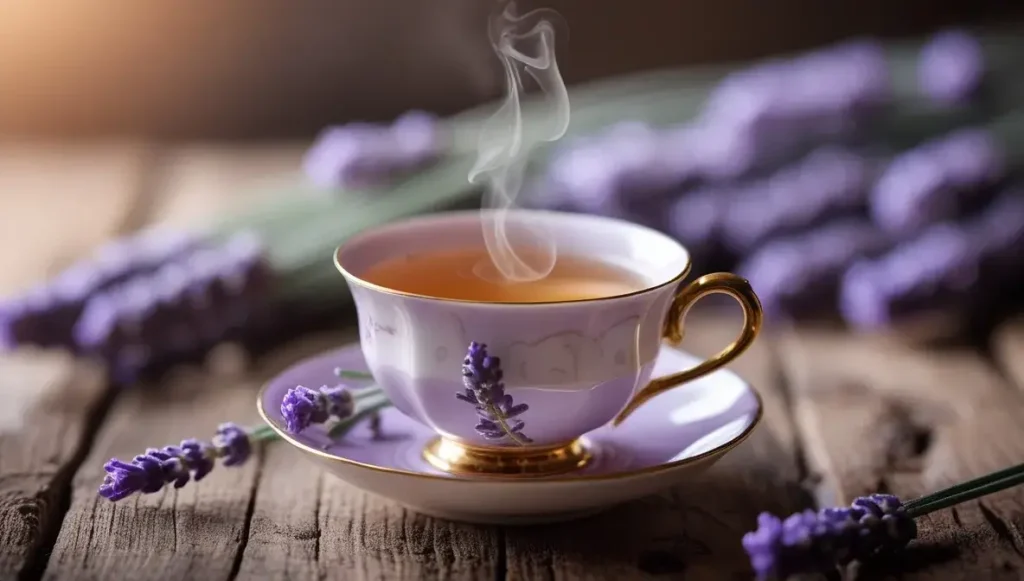
While lavender tea offers various benefits, being aware of potential safety concerns is equally important. Let’s examine some crucial considerations for specific groups and situations.
Lavender tea during pregnancy
Pregnant women should approach lavender tea with caution. Multiple sources advise against consuming lavender tea during pregnancy, as it may lead to complications in later stages. The tea could potentially affect fetal development and even cause uterine stimulation. If you’re pregnant yet still want to enjoy lavender flavors, opt for teas merely flavored with lavender rather than those made primarily from lavender flowers.
Possible side effects: drowsiness, headaches
The primary side effect of lavender tea is drowsiness, naturally occurring due to its relaxing properties. Additional common side effects include headaches, constipation, increased appetite, and sometimes allergic reactions. People sensitive to lavender may experience difficulty breathing, skin rashes, or throat irritation. Anyone experiencing nausea, vomiting, or headaches after drinking lavender tea should stop consuming it immediately.
Is lavender a laxative?
Although lavender isn’t primarily known as a laxative, it can cause constipation, particularly when consumed in excessive amounts. Nonetheless, lavender has been traditionally used to aid digestion.
How much is too much?
Drinking lavender tea in moderation is key. Excessive consumption may lead to serious side effects including constipation, confusion, and blood in urine. Typically, one cup daily is considered safe for most adults.
So, Does Lavender Tea Make You Pee After All?
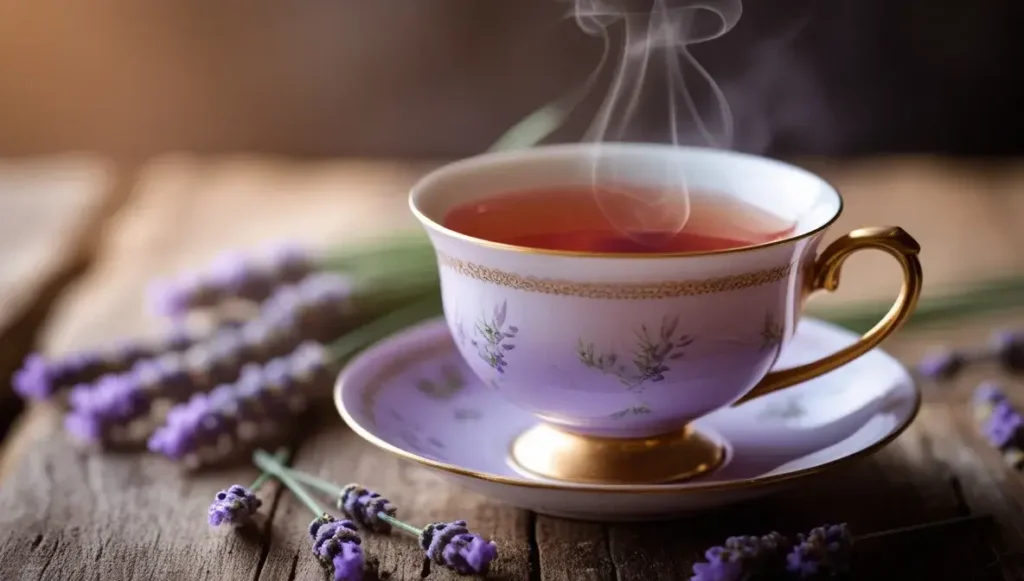
Lavender tea certainly offers numerous health benefits thanks to its calming properties and positive effects on sleep and digestion. Unlike highly caffeinated options such as black or green tea, lavender tea has only mild diuretic effects. Therefore, while you might experience slightly increased urination, the effect remains considerably less pronounced than with caffeinated alternatives.
The science behind lavender tea shows it works primarily through its relaxing compounds like linalool, which affects your nervous system rather than strongly stimulating your kidneys. Additionally, lavender helps with digestive issues and bloating, which may indirectly reduce fluid retention without causing excessive urination.
Most importantly, lavender tea provides hydration benefits that outweigh its mild diuretic properties. Still, moderation remains key when enjoying this herbal beverage. Drinking one cup daily appears safe for most adults, though pregnant women should exercise caution or avoid it altogether due to potential complications.
We must remember that individual responses to lavender tea may vary. Some people might notice increased bathroom visits after consumption, while others experience no change at all. Ultimately, lavender tea serves as a gentler option for those seeking the relaxing benefits of tea without the frequent urination often associated with caffeinated varieties.
👉 Experience Superior lavender tea blends for breakthrough stress relief 👈
Key Takeaways
Understanding lavender tea’s effects on urination helps you make informed choices about this popular herbal beverage and its impact on your daily routine.
• Lavender tea has only mild diuretic effects compared to caffeinated teas like black or green tea, causing minimal increases in urination frequency.
• Unlike caffeinated beverages, lavender tea is actually hydrating and won’t cause dehydration when consumed in normal amounts.
• The tea’s primary benefits focus on relaxation and sleep improvement through compounds like linalool, rather than kidney stimulation.
• One cup daily is considered safe for most adults, but pregnant women should avoid lavender tea due to potential complications.
• Individual responses vary significantly – some may notice increased bathroom visits while others experience no change in urination patterns.
While lavender tea may cause slightly more frequent urination due to its mild diuretic properties, this effect is far less pronounced than caffeinated alternatives, making it an excellent choice for those seeking relaxation benefits without excessive bathroom trips.
FAQs
Q1. Does lavender tea increase urination? Lavender tea may have a mild diuretic effect, which could slightly increase urination frequency. However, its effect is much less pronounced compared to caffeinated teas like black or green tea.
Q2. What are the potential side effects of drinking lavender tea? Common side effects of lavender tea include drowsiness, headaches, and occasionally constipation. Some people may experience allergic reactions such as difficulty breathing or skin rashes. If you experience nausea or vomiting after drinking lavender tea, it’s best to discontinue use.
Q3. Is it safe to drink lavender tea during pregnancy? Pregnant women are generally advised to avoid lavender tea as it may lead to complications in later stages of pregnancy. It could potentially affect fetal development and cause uterine stimulation. It’s best to consult with a healthcare provider before consuming lavender tea during pregnancy.
Q4. How does lavender tea compare to other teas in terms of diuretic effects? Lavender tea has milder diuretic effects compared to caffeinated teas like black or green tea. Herbal teas such as dandelion, horsetail, and hibiscus have stronger diuretic properties than lavender tea.
Q5. What are the main health benefits of drinking lavender tea? Lavender tea offers several health benefits, including reduced anxiety, improved sleep quality, and relief from headaches. It also has a calming effect on the nervous system, aids digestion, and may help alleviate menstrual discomfort.
👉 Don’t miss this Powerful lavender tea deal, elite calm inside 👈
